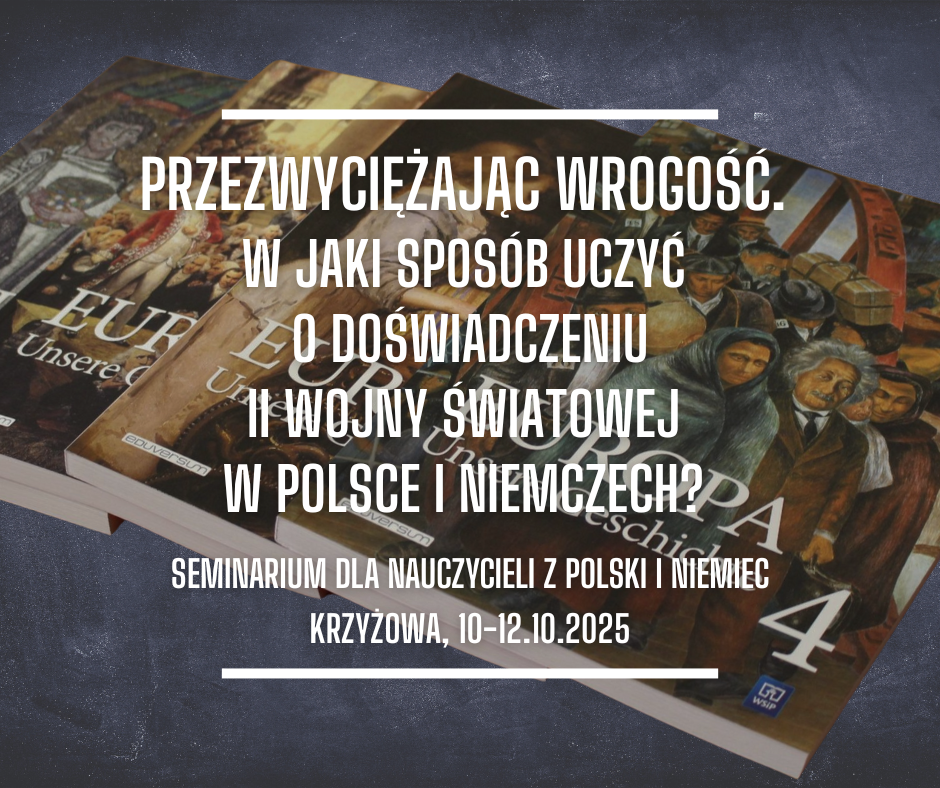
From October 10-12, a seminar for teachers and educators from Poland and Germany took place in Krzyżowa, titled “Overcoming Hostility. How to Teach about the Experience of World War II in Poland and Germany?”
The goals of the seminar were:
- To deepen knowledge regarding issues related to the history of Polish-German relations (from 1939 to the present day).
- To highlight the differences and similarities in Polish and German remembrance of World War II, the Holocaust, and the post-war period.
- To present the experiences of academics and teachers involved in the work of the Joint Polish-German Textbook Commission.
- To present the opportunities offered by the use of the joint Polish-German history textbook “Europa. Nasza historia / Europe – Unsere Geschichte.”
- To present possibilities for utilizing large language models (LLMs) in educational work.
- To network participants and show them opportunities for cooperation with Polish organizations active in the field of historical and civic education.
A total of 60 participants from Poland and Germany took part in the seminar.
Read more: "Overcoming Hostility...". Seminar for Teachers. October 10-12, 2025, Krzyżowa.
 (1).png)
On October 22, 2025, in Krzyżowa and Wrocław, the seven-day seminar “Remembrance, Understanding, Future” begins. It is addressed to young people from ten countries: Albania, Bosnia and Herzegovina, Bulgaria, Croatia, Montenegro, Kosovo, North Macedonia, Serbia, Poland, and Germany.
The aim of the meeting is to present the experience of the Polish-German reconciliation process after World War II, overcoming a difficult and traumatic past, and to highlight contemporary examples of Polish-German dialogue. Participants will jointly reflect on whether these experiences can serve as an inspiration for other nations seeking understanding despite a burdensome history.
The seminar program and topics include, among others:
· Lectures on Polish-German relations between 1939 and 1989 and in the present day,
· The history and significance of Krzyżowa as a place of reconciliation,
· Workshops on the joint Polish-German history textbook,
· Reflections on the path of Central and Eastern European countries to membership in the European Union and on the current state of the Berlin Process,
· Study visits to places of dialogue and remembrance, including the District of Mutual Respect in Wrocław, the Depot History Centre, the former Gross-Rosen concentration camp, and the twin cities of Görlitz/Zgorzelec.
Read more: “Remembrance, Understanding, Future” – an international seminar for young people from the Western...

From September 19 to 21, a training seminar for teachers and educators was held in Krzyżowa, dedicated to the history of the abduction of Polish children by German occupying authorities during World War II, the post-war fate of the stolen children, and the ongoing crime of the abduction of Ukrainian children by Russian authorities.
During the seminar, the following topics were addressed:
-
The history of children from Central and Eastern European countries who were taken from their families by Nazi authorities during World War II
-
The principles of Nazi racial policy and the activities of the Lebensborn organization
-
Measures taken after World War II by Polish authorities to locate and repatriate the stolen children
-
The ongoing abduction of Ukrainian children for the purpose of Russification
-
Experiences of trauma and denationalization
Read more: Report | “Stolen. Germanized…” Seminar for Teachers. September 19–21, 2025

From September 22–24, Warsaw is hosting the 3rd Congress of Researchers of the History of Belarus, Lithuania, Poland, and Ukraine, held under the theme:
“A New Image of Our Neighbours – A New Language, New Narratives, and New Education about the Past, Present, and Future.”
The main focus of the congress is the launch of work on a future Polish-Ukrainian history textbook, developed based on the experience gained during the creation of the joint Polish-German history textbook.
As the organizers emphasize in their official invitation:
“With the Russian invasion of Ukraine in 2014, and later the full-scale war launched by Russia against Ukraine in 2022, it has become evident that the historical knowledge taught in schools—especially in EU countries—regarding the history of Ukraine and other Central and Eastern European states—shows significant gaps.”
Read more: On the way to a Polish-Ukrainian history textbook. The Krzyżowa Foundation for Mutual...



 (1).png)



